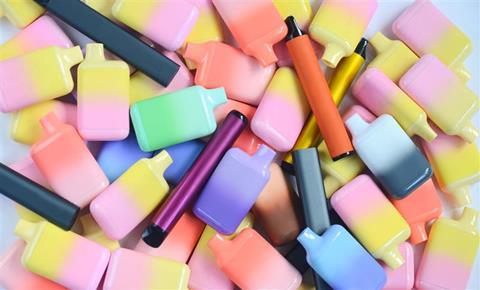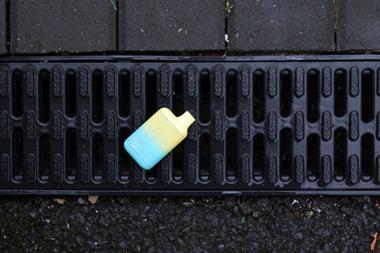
Despite the extension, many retailers have already adapted to shelves without disposables, but some share concerns whether the new timeline is enough to address the practical and enviromental challenges ahead.

Mahesh Odedra, owner of Great Glen Spar store in Leicestershire and Lake Avenue Premier store in Suffolk, explained that while many in the sector have been preparing for the ban, consumers are still purchasing disposables, making it crucial to monitor sales closely to avoid surplus stock.
“People are still buying at the moment, so it’s hard to delist products that are already selling. So over the next few months, we’re going to have to be more tighter on the SKUs to see what is showing so we’re not left with surplus at the end,” he said.
Mahesh criticised the legislation, calling it “farcical” because, while the ban targets the sale of disposables, it doesn’t restrict imports, leaving loopholes for illicit trade. He stressed the need for tighter regulation, such as licensing retailers to prevent rogue sellers from flooding the market.
On the transition to rechargeable vapes, he emphasised the need for customer education. “Especially the older shoppers who moved away from their 20-pack B&H Gold to Blueberry and Raspberry Elf Bar. They need guidance on switching alternatives, as their go-to products will soon be off the market”.
He also mentioned the challenge of educating staff to be knowledgeable about new products, especially in larger teams and stores, where it’s not always realistic for every employee to be a “vape guru”
“It’ll be interesting to see how the government will police the legalisation and what penalties they will impose on non-compliant sellers,” he added.

Atul Sodhul, owner of Londis Harefield, feels that while June provides more time, it still may not be sufficient. “If April wasn’t enough time, then they’ve obviously realised that we needed more time. This extension doesn’t feel very aligned with or supportive of retailers.”
“The vape companies are quite elusive, there’s not much interaction with them. That’s one of my concerns, along with the large amount of disposable stock still out there. No one’s talking about where all these products will go in terms of sustainability and recycling,” said Atul.
He explained that some retailers see the ban as an opportunity to stock up and sell loads of single-use vapes because the “price is going to drop”. “Some are trying to put a positive spin on it, but is June enough time? I don’t think it is. It feels like both the previous government and now Labour are following the same unclear plans, leaving us responsible retailers to hold the foot and figure it out.”

The pushed-back date comes as a relief for Sue Nithyanandan of Costcutter Epsom. “This extension is welcome in two way,” she said. “Many of us have been preparing for the 1 April 2025 deadline, but there were still many retailers who were uncertain of the deadline, especially after the change in government. The clarity of the new date will now hopefully give everyone a chance to sell through their stock and prepare for the deadline.”
Sue’s store had already begun transitioning customers to reusable products. “Disposable sales have dropped, but it’s difficult to tell whether this is because we have already started moving many of our customers to reusable products or if it’s because the market is currently flooded with so many outlets selling them cheaper alternations or if people are genuinely changing their habits,” she added.

Meanwhile Kent-based Nishi Patel of Londis Bexley Park had already been adjusting his stock well in advance of the initial April deadline. “We’re already prepared. We’ve been moving over a lot of our stock, clearing out the slower selling disposables and we’re just going all out and selling all the 600-puff devices we can now between now and the ban.”
He highlighted how quickly suppliers responded to the ban. He said that as soon as the word got out that you needed rechargeable products, the market flooded with “tons coming out every week”. The new innovations meant that he was able to shift his customers over right away.
While the price points for rechargable devices are different, the margins remain similar, Nishi said. “People are moving on and this change is helping some of the underground sales we were seeing with those 10,000 puffs devices because we can now do it with rechargeables.”

The extension provides a reasonable window to prepare, transition and delete existing stock responsibly, explained Neil Godhania owner of Neil’s Premier in Peterborough.
“It allows us to plan ahead and offer alternative products that align with the new legislation. However, the timeline also brings a responsibility for us to start educating customers early, ensuring they understand the changes and are aware of the alternatives.”
Neil said it’s key to work closely with suppliers to adjust inventory and maintain compliance while still meeting customer demand.
“Overall, the extended timeline offers much needed preparation time, but requires clear guidance and ongoing support from industry bodies to ensure a smooth transition,” he advised.
On LinkedIn, Vince Malone of Tenby Store and Post Office wrote that “focus is required in managing this department to avoid potential problems and losses come 1st June.”































No comments yet